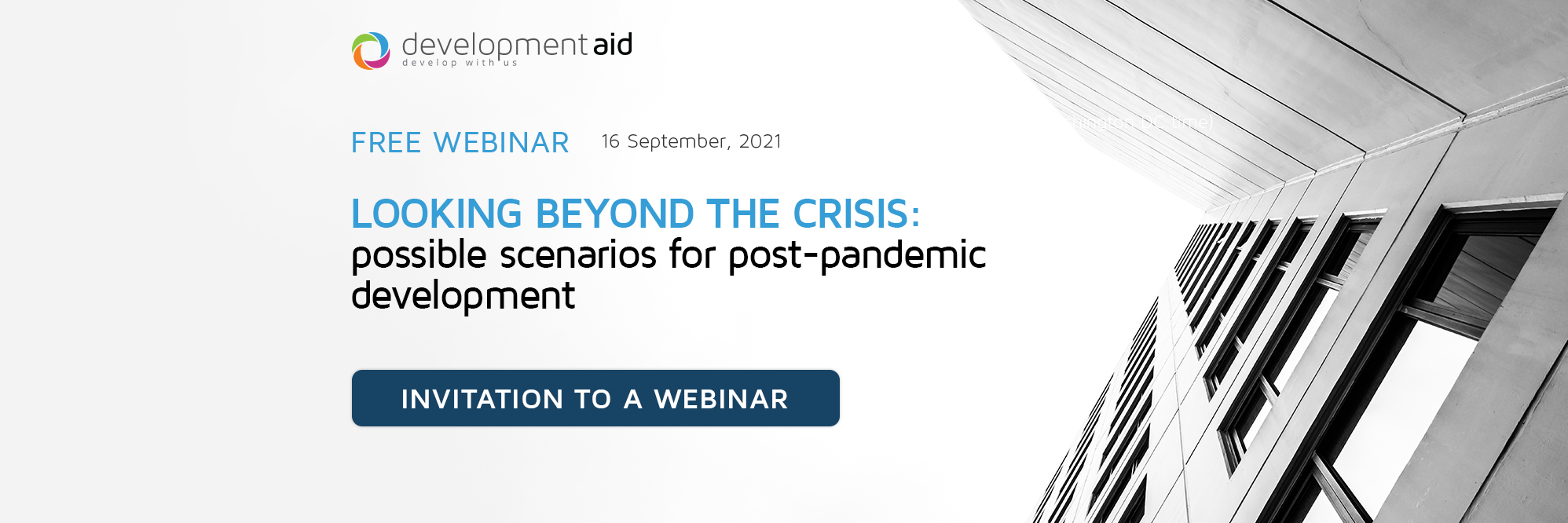Amid the uncertainty and change caused by the pandemic, strategic foresight is gaining considerable attention among those involved in decision-making processes. Several organizations, such as the Organization for Economic Co-operation and Development (OECD) and the International Civil Society Centre, are looking to assist various actors in building the capacity to anticipate and prepare for a turbulent future by providing a set of foresight approaches. DevelopmentAid has announced a webinar with leading experts from the field to discuss strategic foresight and its application in times of uncertainty and to share a few practical tips on how to use it to achieve efficient planning and decision-making.
What is Strategic Foresight?
Foresight represents a planning-oriented discipline that aims to explore, anticipate and shape future developments by using collective intelligence, scenario-building methodologies, and technological resources. In this context, strategic foresight refers to a set of structured and systematic activities that allow organizations and public authorities to prepare and develop transition pathways in order to withstand potential shocks and shape future developments. It is important to mention that strategic foresight is not used to predict the future but rather to offer a set of tools to ensure efficient (policy) decision-making in the face of high uncertainty.
Fig.1. Examples of Strategic Foresight Methods
Source: OECD – Strategic Foresight for Better Policies. Strategic Foresight Methods
Scenarios for Post-pandemic Development
As a response to the pandemic crisis, the OECD Strategic Foresight Unit has developed a cross-sectoral web resource to help governments and organizations to understand and use foresight tools for COVID-19 related decision-making. The document indicates a set of key uncertainties and possible future developments for various interconnected systems such as society, economy, technology or international development. For each dimension, several key questions are raised followed by a number of possible scenarios regarding the further evolution of the crisis.
Fig.2. Illustrative Scenarios of Future Spread and Effects of COVID-19

Source: OECD – Strategic foresight for the COVID-19 crisis and beyond
Focus on the ‘How’
For its part, in response to the COVID crisis, The International Civil Society Centre, a Berlin-based not-for-profit organization, has developed an extensive guide to assist the civil society sector with tips and best practices that can support strategic decision-making in a time of uncertainty. It invites readers to focus on the values-driven ‘how’, rather than the uncertain ‘what’. The authors argue that organizations cannot control external events and disruptions; however, they do have control over:
- how they take decisions about this during times of turbulence, and
- how they do things, with both existing programs and longer-term strategic adaptation
The Centre’s Scanning the Horizon is a unique cross-sector community for collaborative civil society horizon scanning to strengthen strategic thinking and explore future-readiness on major sustainable development drivers. Convening since 2016, it currently has more than 35 members from international civil society, philanthropy, academia, and the private sector. Alongside regular community events and peer exchanges, common experiences are shared as wider insights and recommendations for the broader civil society sector through the ‘Sector Guides’ which so far have included the influence of global China and now strategic decision-making in complex and uncertain times.
Invitation to a Webinar
To learn more about the OECD Strategic Foresight Unit, to gain more insight into the “how” method, and to discover practical tips on how to use strategic foresight, DevelopmentAid invites you to attend an exciting webinar on “Looking beyond the crisis: possible scenarios for post-pandemic development” that will take place on 16 September 2021 at 4:00 pm (Brussels Time)/10:00 am (Washington DC Time).
 Speaker: Alanna Markle, Strategic Foresight Analyst with the OECD’s Central Strategic Foresight Unit;
Speaker: Alanna Markle, Strategic Foresight Analyst with the OECD’s Central Strategic Foresight Unit;
 Speaker: Vicky Tongue, Head of Futures and Innovation at International Civil Society Centre.
Speaker: Vicky Tongue, Head of Futures and Innovation at International Civil Society Centre.
 Host: Ion Ilasco, External Relations & Events at DevelopmentAid.
Host: Ion Ilasco, External Relations & Events at DevelopmentAid.
Alanna Markle is a Strategic Foresight Analyst with the OECD’s central Strategic Foresight Unit. Her work uses foresight processes, futures analysis, and data storytelling to illuminate complex issues from a systems perspective. Alanna is also a former Fulbright Scholar and was the 2019 recipient of the SOIF Next Generation Foresight Practitioners Award for national policy.
Vicky Tongue is the International Civil Society Centre’s Head of Futures and Innovation. Vicky is the lead author of the Centre’s annual Civil Society Innovation thematic report. Vicky has 15 years’ experience of senior program management with several leading UK-based ISCOs, including MSI Reproductive Choices, Article 19, CAFOD, ODI, and Save the Children.
*Attendees are encouraged to participate in the discussions by submitting their views on the following question:
What uncertainties or disruptions do you see on the horizon that are currently “under the radar” and could have an impact on the international development sector?
- Tip: phrase your contribution as a “what if” question
- Example: What if developing countries emerge from the COVID-19 crisis with lower levels of trust, leading to long-term shifts away from development co-operation with the Global North?
Inputs can be submitted at i.ilasco@developmentaid.org or via the registration page.


